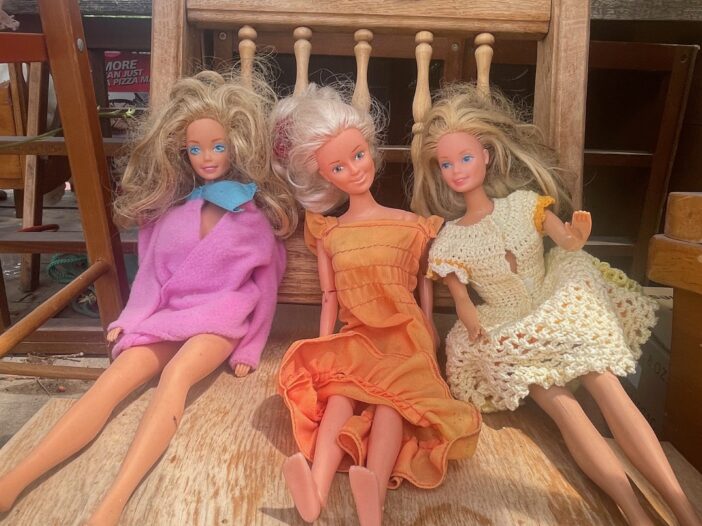

Photo: Author (notice the flat feet on the middle Barbie)
I saw the Barbie movie twice. I can’t stop thinking about it.
I needed to see the movie twice because the first time I was thinking too much. Not only did the movie move quickly –especially the dialogue was fast! The movie triggered past memories such as:
I knew in college if I worked hard, I could earn the grades. After college, one of my male classmates and I started at the bank in the same training program. Why was he paid a few more thousand more dollars that me? We had the same major and background except he was male. I would never catch up, but banking was not for me. At that time, banking was too passive and upward mobility was limited. I was told that after I completed the training program, I propose the departments that were of interest. I said, “Correspondent banking,” and I was told, “Those bankers have to travel so we can’t have a woman in that department.” Things have changed, but that was what I faced at the time. Banking was not going to change. So I changed and went back to graduate school–took control of my situation. Lesson learned.
When I was in college, I started dating someone and we were in the same department and had several classes together. I wanted to make sure he knew he was not dating a dumb blond. So I worked to excel. If I out performed him, that was not easily accepted. Let’s just say the relationship was short-lived. Lesson learned.
As a college student in the 70s, I took a course titled “Women’s Liberation.” As I watched Barbie, I thought of the major paper I wrote for the course: Women’s Liberation = Human Liberation. When Ken says something about really not wanting to be in charge of everything. “He admits that the gig is hard, and lost its luster once he realized that horses didn’t play as big a role in the patriarchy as he thought.” It is a lot of pressure for men to have to be the breadwinners, make the decisions, control everyone’s destiny. If you free women from roles, you free men of their roles too. Let everyone play to their strengths. I thought this in college and I still think that now. Lesson learned.
When I started teaching college, a male colleague started at the same time. We became quick friends because our backgrounds were exactly the same at the time. We both had just received our MBAs and no previous teaching experience. A few years into the position, we discover he started at $1000 more than me! And when raises are given as a straight percentage, the gap just gets bigger. When I asked him about it, we realized that he was offered what I was offered and he turned it down. He negotiated. Research supports that women do not negotiate as often or as well as men. I have tried to negotiate when possible. Lesson learned.
One more observation. Toward the beginning of the movie, Barbie asks during a wild dance party in Barbie Land if any of the other Barbies think about dying. And everything stops–the music, dancing, laughter. This reflects how our society is fearful of dying and really scared to talk about it or even think about it. Even though death can happen at any age or stage of life. When we embrace death, we are freer to live.
If you want to read some good articles and blog posts about the movie, here is a sampling of what I have read:
If you want to know why a mother took her sons to see the movie, click here.
If you want to know what a former Mattel employee thought of the movie, click here.
If you want to know why Barbie resonated with a smart professional friend of mine, Sally. She explains it in a thoughtful piece. She points out the significance of “Gloria’s” powerful monologue:
“It is literally impossible to be a woman. You are so beautiful, and so smart, and it kills me that you don’t think you’re good enough. Like, we have to always be extraordinary, but somehow we’re always doing it wrong.
You have to be thin, but not too thin. And you can never say you want to be thin. You have to say you want to be healthy, but also you have to be thin…” (read the full text here)…
“You’re supposed to stay pretty for men, but not so pretty that you tempt them too much or that you threaten other women because you’re supposed to be a part of the sisterhood.
But always stand out and always be grateful. But never forget that the system is rigged. So find a way to acknowledge that but also always be grateful. You have to never get old, never be rude, never show off, never be selfish, never fall down, never fail, never show fear, never get out of line.
It’s too hard! It’s too contradictory and nobody gives you a medal or says thank you! And it turns out, in fact, that not only are you doing everything wrong, but also everything is your fault…”
What is your personal monologue? What are you telling yourself?
 Sign Up and Download Your FREE Copy of The Top 5 Actions For Creating Your Own Breadcrumb Legacy™
Sign Up and Download Your FREE Copy of The Top 5 Actions For Creating Your Own Breadcrumb Legacy™
